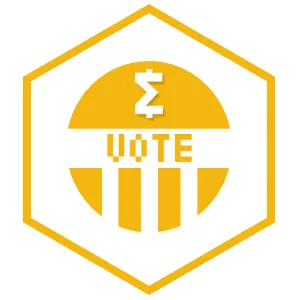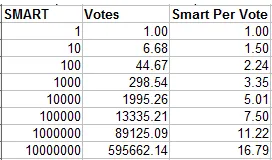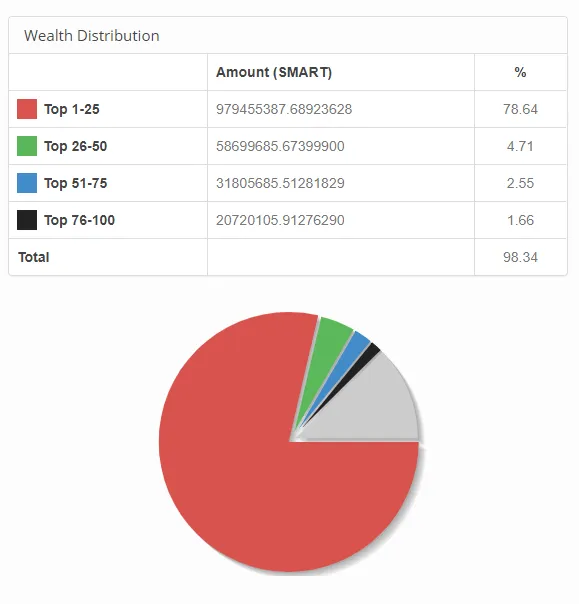
A week ago I posted some thoughts about improving the SmartCash Voting system. My aim is to ensure the risk of the largest stakeholders is properly rewarded, what at the same time guarding against the possibility of an oligarchy being created. My suggested algorithm change is as follows: currently it's 1 SMART = 1 vote. My suggestion is votes = SMART*(SMART/SMART^1.175), where the value of the exponent is flexible and should be decided on by the community. I use 1.175 as a starting point for consideration only.

It's not as simple as just creating an algorithm, however. Some folks have pointed out what a fatal flaw in implementing any such improvements. Currently, over 50% of SMART in existence is sitting in the community fund wallet so that is a bit of a safety right there. But things can change, and they can change quickly. Without verifying a person’s identity beyond their public / private key thus eliminating privacy, we cannot prevent a future scenario where any individual with the capital and the desire to do so could abuse the system. This seems to me to be a potentially fatal flaw in and of itself, and I can't believe there is simply no possible way to solve it.
I would like to point out that while making more addresses would dilute the desired effect, under my algorithm the most efficient way to increase voting power is to make multiple addresses all with one SMART. The further away you go from 1 address per 1 vote, the less voting power you have. So someone with 1,000,000 SMART would have to create 1,000,000 addresses to most effectively “game the system”. Even creating 1,000 addresses may not do enough to make it worthwhile. And the algorithm could be tuned and improved to control exactly how much of a pain in the ass / impossibility the “just make more addresses” thing is.
Let me be clear that in discussing voting system reforms I do not mean to suggest that those who have accumulated huge amounts of SMART thus far are or should in any way be under suspicion. I am drawing attention to a possible–and some might agree that it is a likely–future scenario based on what SmartCash governance rules allow and how the world’s largest creators and holders of capital have acted in the real world thus far. I believe that SMART can and should strive for a different outcome than what fiat / fractional reserve has produced.

The SmartCash community is actually in fact smart. If we agree we would like to guard against centralization and against an oligarchy ever dictating the use of the community fund--short of an anonymous blockchain fingerprint voting system which is a little too dystopian-future for me--I know we can do it.
SMART is less than a year old. It is my belief that it will be one of the few cryptocurrencies that goes on to actually continue to be used several years down the road. In several years time, a lot of SMART will have changed hands. If some gigantic capital enterprise should decide to set up 10,000 SmartNodes, put 1 PH/s of hash power on a mining pool, and buy up all the SMART it can find, they could gain dictatorial control over the community fund. Implementing an algorithm like I am suggesting would let today’s users and largest holders of SMART prevent this scenario from happening in the future by hodling a good amount and being active in voting.
How would this actually work as far as ensuring the largest stakeholders still have the largest say? Let’s say that fictional Bill Gates has 51% of all of stock in fictional Microsoft, which has fictionally decided to implement a community-run corporate governance system. If we apply a non-1-to-1 stock-to-voting-power algorithm in fictional Microsoft, we can fine tune things however we like to produce the desired effect. We could decide that, for example, no individual or corporate person may hold more than 49% of the voting power. So fictional Bill Gates would still have more decision making power than anyone else because he has more stock than anyone else and he did more to get the company to where it currently is than anyone else. But he would not have complete dictatorial control over the corporate governance.
I am not proposing a change in who has the most votes and who has the second most. I am simply stating we should apply some intelligence over how far #1 can be in front of #2, or how far numbers 1 to 10 can be in front of numbers 11 to 1,000,000. It’s a “safety mechanism” against the largest holders of capital ever abusing the community fund for their own purposes without any chance of a challenge from the rest of the community.
![hexagons-steem[1].jpg](https://images.ecency.com/p/vM1pGHgNcyCiaxZmdb555hkjecmqomntNdRp7jgA1A5e44Mx7VepkwmeckaGvSr7bZAGZJrQsPVwWi57yx3szzgfKUS7VXVshy8FfhjKReuKd3r6KhuTEEkKsA6QvGftFHFpCox.png?format=match&mode=fit)